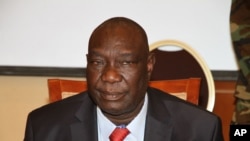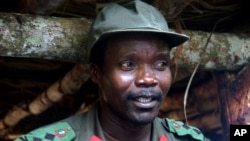BANGUI —
A power vacuum and the total absence of law and order in the vast, sparsely populated Central African Republic could be luring terror groups from across Africa. A senior United Nations official says there are indications that Nigeria’s Boko Haram is on the ground.
Carved out by colonialism and marred by coups since independence in 1960, the broken heart of Africa has received little attention from the outside except from former ruler France, diamond dealers, big game hunters and cross-border rebel groups.
Experts say all the elements exist to attract militants who are looking to set up shop, hide, or hijack the country's increasingly sectarian conflict that has seen Muslims and Christians turn against one another for the first time.
CAR's de facto President Michel Djotodia enlisted bands of Muslim rebels -- including mercenaries from Chad and Sudan and bandits calling themselves “Seleka”, or alliance -- to help him seize power eight months ago.
According to CAR Justice Minister Arcene Sende, they were joined by 1,500 prisoners, a third of whom were convicted of murder.
Analysts say the initial “Seleka” forces of a few thousand -- who took power in March -- have multiplied in the wake of mass impunity for looting, rape and killing. Analysts suggest the number could now be as large as 25,000. The United Nations Children's Fund estimates that 3,500 children have been co-opted into the ranks.
CAR’s home-grown terror combined with its diamond, gold and ivory riches are a draw for armed groups chased from elsewhere in Africa by regional and international forces.
Edmond Mulet, assistant secretary-general for peacekeeping operations at the United Nations in New York, said the complete absence of a working government in CAR is similar to northern Mali in 2012 -- where Islamist groups affiliated with al-Qaida stepped into the political vacuum and took over.
2009
2010
2011
2012
2013
Mulet told VOA he thinks the first ones to arrive in the CAR in may be the Nigerian terrorist group Boko Haram - who are already present in neighboring northern Cameroon.
“I don't think about al-Shabab, but certainly Boko Haram we have some indications that there is some kind of a presence here," said Mulet. "In different places, different elements are really already trying to get hold of some presence in the country.”
CAR Prime Minister Nicolas Tiangaye did not want to talk to VOA directly on the issue of Boko Haram - but said concern would not be unfounded.
“I can't talk to you about it. It's just because you brought it up … but it's not enough to confirm it yet," said Tiangaye. "In any case, for the jihadists yes, we have some elements, we have some elements. For now, we don't have all the elements to confirm their effective presence.”
This month the United States officially designated Boko Haram as a terrorist organization. The group seeks to impose strict Islamic law across Nigeria’s Muslim-majority north and has killed thousands in attacks going back to 2009.
The Nigerian government has the northeast under a state of emergency and the military is waging an intense offensive - which may be forcing militants to consider new bases outside its borders.
CAR has long been a favorite hideout of brutal warlord Joseph Kony, whose Lord's Resistance Army has terrorized communities in nearby Uganda, South Sudan and the Democratic Republic of Congo for decades.
U.S. special forces have been assisting thousands of African soldiers in hunting for Kony - who has a $5 million bounty on his head.
With the growing international involvement against terrorism in Africa, the question arises whether alluding to Boko Haram’s presence in the CAR isn’t a tactic to elicit more foreign funds and soldiers on the ground.
General Babacar Gaye, who heads the U.N. peacekeeping mission in CAR, said fears over global terror groups is secondary to the massive humanitarian, security and human rights problems that has forced hundreds of thousands from their homes and left a third of the population in need.
“For the time being, we don't need to have the presence of any terrorists groups to be mobilized and concerned by the situation," said Gaye. "I can assure you that the people of the ground, their suffering is worth mobilizing the international community to stabilize this country and alleviate the suffering. We don't need to have Boko Haram to mobilize people.”
The U.N. has warned that “the seeds of genocide” are being sown in CAR. But with so few watching the forest-covered country, it will be hard to know when, or if, terror groups take root, or mass violence begins.
Photo Gallery: Crisis in CAR
Carved out by colonialism and marred by coups since independence in 1960, the broken heart of Africa has received little attention from the outside except from former ruler France, diamond dealers, big game hunters and cross-border rebel groups.
Experts say all the elements exist to attract militants who are looking to set up shop, hide, or hijack the country's increasingly sectarian conflict that has seen Muslims and Christians turn against one another for the first time.
CAR's de facto President Michel Djotodia enlisted bands of Muslim rebels -- including mercenaries from Chad and Sudan and bandits calling themselves “Seleka”, or alliance -- to help him seize power eight months ago.
According to CAR Justice Minister Arcene Sende, they were joined by 1,500 prisoners, a third of whom were convicted of murder.
Analysts say the initial “Seleka” forces of a few thousand -- who took power in March -- have multiplied in the wake of mass impunity for looting, rape and killing. Analysts suggest the number could now be as large as 25,000. The United Nations Children's Fund estimates that 3,500 children have been co-opted into the ranks.
CAR’s home-grown terror combined with its diamond, gold and ivory riches are a draw for armed groups chased from elsewhere in Africa by regional and international forces.
Edmond Mulet, assistant secretary-general for peacekeeping operations at the United Nations in New York, said the complete absence of a working government in CAR is similar to northern Mali in 2012 -- where Islamist groups affiliated with al-Qaida stepped into the political vacuum and took over.
Boko Haram
Major attacks blamed on Nigeria's Boko Haram2009
- July - Attacks prompt government crackdown in Bauchi and Maiduguri; 800 people killed
2010
- December - Bombings in central Nigeria and church attacks in the northeast kill 86
2011
- June - Attack on a bar in Maiduguri kills 25
- August - Suicide bomber kills 23 at U.N. building in Abuja
- November - Bombings in Damaturu and Potiskum kill 65
- December - Christmas Day bombings across Nigeria kill 39
2012
- January -- Gun and bomb attacks in Kano kill up to 200
- February - Maiduguri market attack kills 30
- June - Suicide car bombings at three churches kill 21
- July - Attacks in Plateau state kill dozens, including two politicians at a funeral for the victims
2013
- February - French family kidnapped in Cameroon, held hostage for two months
- April - Fighting with troops in Baga kills up to 200; residents say troops set deadly fires
- May - Attacks in Bama kill more than 50
- July - Gunmen kill 30 at a school in Yobe
- August - Gunmen kill 44 at a mosque outside Maiduguri
- September - Gunmen kill 40 students a dorm in Yobe
- October - Attack Yobe state capital Damaturu, clash with military in Borno state
“I don't think about al-Shabab, but certainly Boko Haram we have some indications that there is some kind of a presence here," said Mulet. "In different places, different elements are really already trying to get hold of some presence in the country.”
CAR Prime Minister Nicolas Tiangaye did not want to talk to VOA directly on the issue of Boko Haram - but said concern would not be unfounded.
“I can't talk to you about it. It's just because you brought it up … but it's not enough to confirm it yet," said Tiangaye. "In any case, for the jihadists yes, we have some elements, we have some elements. For now, we don't have all the elements to confirm their effective presence.”
This month the United States officially designated Boko Haram as a terrorist organization. The group seeks to impose strict Islamic law across Nigeria’s Muslim-majority north and has killed thousands in attacks going back to 2009.
The Nigerian government has the northeast under a state of emergency and the military is waging an intense offensive - which may be forcing militants to consider new bases outside its borders.
CAR has long been a favorite hideout of brutal warlord Joseph Kony, whose Lord's Resistance Army has terrorized communities in nearby Uganda, South Sudan and the Democratic Republic of Congo for decades.
U.S. special forces have been assisting thousands of African soldiers in hunting for Kony - who has a $5 million bounty on his head.
With the growing international involvement against terrorism in Africa, the question arises whether alluding to Boko Haram’s presence in the CAR isn’t a tactic to elicit more foreign funds and soldiers on the ground.
General Babacar Gaye, who heads the U.N. peacekeeping mission in CAR, said fears over global terror groups is secondary to the massive humanitarian, security and human rights problems that has forced hundreds of thousands from their homes and left a third of the population in need.
“For the time being, we don't need to have the presence of any terrorists groups to be mobilized and concerned by the situation," said Gaye. "I can assure you that the people of the ground, their suffering is worth mobilizing the international community to stabilize this country and alleviate the suffering. We don't need to have Boko Haram to mobilize people.”
The U.N. has warned that “the seeds of genocide” are being sown in CAR. But with so few watching the forest-covered country, it will be hard to know when, or if, terror groups take root, or mass violence begins.
Photo Gallery: Crisis in CAR







